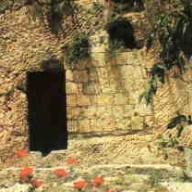 To follow are excerpts from Charles Spurgeon's sermon entitled, "The Tomb of Jesus," which was delivered on April 8, 1855, from Exeter Hall, Strand.
To follow are excerpts from Charles Spurgeon's sermon entitled, "The Tomb of Jesus," which was delivered on April 8, 1855, from Exeter Hall, Strand.(Click here to read the entire sermon).
"THE TOMB OF JESUS"
"Come, see the place where the Lord lay."
—Matthew 28:6.
I. AN INVITATION GIVEN. I shall commence my remarks this morning by inviting all Christians to come with me to the tomb of Jesus. "Come, see the place where the Lord lay." We will labor to render the place attractive, we will gently take your hand to guide you to it; and may it please our Master to make our hearts burn within us while we talk by the way.Away, ye profane—ye souls whose life is laughter, folly, and mirth! Away, ye sordid and carnal minds who have no taste for the spiritual, no delight in the celestial. We ask not your company; we speak to God's beloved, to the heirs of heaven, to the sanctified, the redeemed, the pure in heart—and we say to them, "Come, see the place where the Lord lay." Surely ye need no argument to move your feet in the direction of the holy sepulchre; but still we will use the utmost power to draw your spirit thither. Come, then, for 'tis the shrine of greatness, 'tis the resting-place of the man, the Restorer of our race, the Conqueror of death and hell. Men will travel hundreds of miles to behold the place where a poet first breathed the air of earth; they will journey to the ancient tombs of mighty heroes, or the graves of men renowned by fame; but whither shall the Christian go to find the grave of one so famous as was Jesus? Ask me the greatest man who ever lived—I tell you the man Christ Jesus was "anointed with the oil of gladness above his fellow." If ye seek a chamber honored as the resting-place of genius, turn in hither; if ye would worship at the grave of holiness, come ye here; if ye would see the hallowed spot where the choicest bones that e'er were fashioned lay for awhile, come with me, Christian, to that quiet garden, hard by the walls of Jerusalem. 

Come with me, moreover, because it is the tomb of your best friend. The Jews said of Mary, "she goeth unto his grave to weep there." Ye have lost your friends, some of you, ye have planted flowers upon their tombs, ye go and sit at eventide upon the green sward, bedewing the grass with your tears, for there your mother lies, and there your father or your wife. Oh! in pensive sorrow come with me to this dark garden of our Saviour's burial; come to the grave of your best friend—your brother, yea, one who "sticketh closer than a brother." Come thou to the grave of thy dearest relative, O Christian, for Jesus is thy husband, "Thy maker is thy husband, the Lord of Hosts is his name." Doth not affection draw you? Do not the sweet lips of love woo you? Is not the place sanctified where one so well-beloved slept, although but for a moment ? Surely ye need no eloquence; if it were needed I have none. I have but the power, in simple, but earnest accents, to repeat the words, "Come, see the place where the Lord lay." On this Easter morning pay a visit to his grave, for it is the grave of your best friend.
There is yet one reason more why I would have thee visit this royal sepulchre—because it is a quiet spot. Oh! I have longed for rest, for I have heard this world's rumors in my ears so long, that I have begged for where I might hide myself forever. I am sick of this tiring and trying life; my frame is weary, my soul is mad to repose herself awhile. I would I could lay myself down a little by the edge of some pebbly brook, with no companion save the fair flowers or the nodding willows. I would I could recline in stillness, where the air brings balm to the tormented brain, where there is no murmur save the hum of the summer bee, no whisper save that of the zephyrs, and no song except the caroling of the lark. I wish I could be at ease for a moment. I have become a man of the world; my brain is racked, my soul is tired. Oh! wouldst thou be quiet, Christian? Merchant, wouldst thou rest from thy toils? wouldst thou be calm for once? Then come hither. It is in a pleasant garden, far from the hum of Jerusalem; the noise and din of business will not reach thee there; "Come, see the place where the Lord lay." It is a sweet resting spot, a withdrawing room for thy soul, where thou mayest brush from thy garments the dust of earth and muse awhile in peace.
II. ATTENTION REQUESTED. Thus I have pressed the invitation; now we will enter the tomb. Let us examine it with deep attention, noticing every circumstance connected with it.And, first, mark that it is a costly tomb. It is no common grave; it is not an excavation dug out by the spade for a pauper, in which to hide the last remains of his miserable and overwearied bones. It is a princely tomb; it was made of marble, cut in the side of a hill. Stand here, believer, and ask why Jesus had such a costly sepulchre. He had no elegant garments; he wore a coat without seam, woven from the top throughout, without an atom of embroidery. He owned no sumptuous palace, for he had not where to lay his head. His sandals were not rich with gold, or studded with brilliants. He was poor. Why, then does he lie in a noble grave? We answer, for this reason: Christ was unhonored till he had finished his sufferings; Christ's body suffered contumely, shame, spitting, buffeting, and reproach, until he had completed his great work; he was trampled under foot, he was "despised and rejected of men; a man of sorrows, and acquainted with grief;" but the moment he had finished his undertaking, God said, "No more shall that body be disgraced; if it is to sleep, let it slumber in an honorable grave; if it is to rest, let nobles bury it; let Joseph, the councillor, and Nicodemus, the man of Sanhedrim, be present at the funeral; let the body be embalmed with precious spices, let it have honor; it has had enough of contumely, and shame, and reproach, and buffeting; let it now be treated with respect."
Christian, dost thou discern the meaning? Jesus, after he had finished his work, slept in a costly grave; for now his Father loved and honored him, since his work was done.

Let us not weary in this pious investigation, but with fixed attention observe everything connected with this holy spot. The grave, we observe, was cut in a rock. Why was this? the rock of Ages was buried in a rock—a Rock within a rock. But why? Most persons suggest that it was so ordained, that it might be clear that there was no covert way by which the disciples or others could enter and steal the body away. Very possibly it was the reason; but O! my soul, canst thou find a spiritual reason? Christ's sepulchre was cut in a rock. It was not cut in mould that might be worn away by the water, or might crumble and fall into decay. The sepulchre stands, I believe, entire to this day; if it does not naturally, it does spiritually. The same sepulchre which took the sins of Paul, shall take my iniquities into his bosom, for if I ever lose my guilt, it must roll off my shoulders into the sepulchre. It was cut in a rock, so that if a sinner were saved a thousand years ago, I too can be delivered, for it is a rocky sepulchre where sin was buried—it was a rocky sepulchre of marble where my crimes were laid forever—buried never to have a resurrection.
III. Emotion excited. We have thus surveyed the grave with deep attention, and, I hope, with some profit to ourselves. But that is not all. I love a religion which consists, in a great measure, of emotion. Now, if I had power, like a master, I would touch the strings of your hearts, and fetch a glorious tune of solemn music from them, for this is a deeply solemn place into which I have conducted you.First, I would bid you stand and see the place where the Lord lay with emotions of deep sorrow. Oh cone, my beloved brother, thy Jesus once lay there. He was a murdered man, my soul, and thou the murderer.
First, I would bid you stand and see the place where the Lord lay with emotions of deep sorrow. Oh cone, my beloved brother, thy Jesus once lay there. He was a murdered man, my soul, and thou the murderer.
I slew him—this right hand struck the dagger to his heart. My deeds slew Christ. Alas! I slew my best beloved; I killed him who loved me with an everlasting love. Ye eyes, why do you refuse to weep when ye see Jesus' body mangled and torn? Oh! give vent to your sorrow, Christians, for ye have good reason to do so. I believe in what Hart says, that there was a time in his experience when he could so sympathize with Christ, that he felt more grief at the death of Christ than he did joy. It seemed so sad a thing that Christ should have to die; and to me it often appears too great a price for Jesus Christ to purchase worms with his own blood. Methinks I love him so much, that if I had seen him about to suffer, I should have been as bad as Peter, and have said, "That be far from thee, Lord;" but then he would have said to me, "Get thee behind me, Satan", for he does not approve of that love which would stop him from dying. "The cup which my Father hath given me, shall I not drink it?" But I think, had I seen him going up to his cross, I could fain have pressed him back and said "Oh! Jesus, thou shalt not die; I cannot have it. Wilt thou purchase my life with a price so dear?" It seems too costly for him who is the Prince of Life and Glory to let his fair limbs be tortured in agony; that the hands which carried mercies should be pierced with accursed nails; that the temples that were always clothed with love should have cruel thorns driven through them. It appears too much. Oh! weep, Christian, and let your sorrow rise. Is not the price all but too great, that your beloved should for you resign himself? Oh! I should think, if a person were saved from death by another, he would always feel deep grief if his deliverer lost his life in the attempt. I had a friend, who, standing by the side of a piece of frozen water, saw a young lad in it, and sprang upon the ice in order to save him. After clutching the boy, he held him in his hands and cried out, "Here he is! Here he is! I have saved him." But, just as they caught hold of the boy, he sank himself, and his body was not found for some time afterwards, when he was quite dead. Oh! it is so with Jesus. My soul was drowning. From heaven's high portals he saw me sinking in the depths of hell; he plunged in:
Ah! we may indeed regret our sin, since it slew Jesus.Now, Christian, change thy note a moment. "Come, see the place where the Lord lay," with joy and gladness. He does not lie there now. Weep, when ye see the tomb of Christ, but rejoice because it is empty. Thy sin slew him, but his divinity raised him up. Thy guilt hath murdered him, but his righteousness hath restored him. Oh! he hath burst the bonds of death, he hath ungirt the cerements of the tomb, and hath come out more than conqueror, crushing death beneath his feet. Rejoice, O Christian, for he is not there—he is risen."Come, see the place where the Lord lay."One more thought, and then I will speak a little concerning the doctrines we may learn from this grave. "Come, see the place where the Lord lay." with solemn awe for you and I will have to lie there too.
We know not when he is dying. One gentle sigh, and the spirit breaks away. We can scarcely say, "he is gone," before the ransomed spirit takes its mansion near the throne. Come to Christ's tomb, then, for the silent vault must soon be your habitation. Come to Christ's grave, for ye must slumber there. And even you, ye sinners, for one moment I will ask you to come also, because ye must die as well as the rest of us. Your sins cannot keep you from the jaws of death. I say, sinner, I want thee to look at Christ's sepulchre too, for when thou diest it may have done thee great good to think of it. You have heard of Queen Elizabeth, crying out that she would give an empire for a single hour. Or have you heard the despairing cry of the gentleman on board the "Arctic," when it was going down, who shouted to the boat, "Come back! I will give you £30,000 if you will come and take me in." Ah! poor man, it were but little if he had thirty thousand worlds, if he could thereby prolong his life: "Skin for skin, yea, all that a man hath, will he give for his life." Some of you who can laugh this morning, who came to spend a merry hour in this hall, will be dying, and then ye will pray and crave for life, and shriek for another Sabbath-day. Oh! how the Sabbaths ye have wasted will walk like ghosts before you! Oh! how they will shake their snaky hair in your eyes! How will ye be made to sorrow and weep, because ye wasted precious hours, which, when they are gone, are gone too far to be recalled. May God save you from the pangs of remorse.
Come, view the place then, with all hallowed meditation, where the Lord lay. Spend this afternoon, my beloved brethren, in meditating upon it, and very often go to Christ's grave, both to weep and to rejoice. Ye timid ones, do not be afraid to approach, for 'tis no vain thing to remember that timidity buried Christ. Faith would not have given him a funeral at all; faith would have kept him above ground, and would never have let him be buried; for it would have said, it would be useless to bury Christ if he were to rise. Fear buried him. Nicodemus, the night disciple, and Joseph of Arimathea, secretly, for fear of the Jews, went and buried him. Therefore, ye timid ones, ye may go too. Ready-to-halt, poor Fearing, and thou, Mrs. Despondency, and Much-afraid, go often there; let it be your favorite haunt, there build a tabernacle, there abide. And often say to your heart, when you are in distress and sorrow, "Come, see the place where the Lord lay."
Tomorrow:
Excerpts from Charles Spurgeon's sermons, "The Cross-our Glory," and "The Resurrection of Our Lord Jesus."



2 comments:
I love Charles Spurgeon,
He is so cut and dry, and so full of real passion! His book Lectures to my students is a great book that I have enjoyed. Good practical advice. I love that he was virtually a Holy-Spirit taught man. I heard that he never went to cemetary. Ooops I mean Seminary!
I am a musician and I would be honored if you would check out my music. All my music is free for download. Anyway, I don't mean to be a pest, just thought I'd share.
Thanks,
-Sean
______________________
www.SeanDietrich.com
"All my muisc is free."
Sean,
Yes, Spurgeon is pretty much a favorite of mine.
Great line about "cemetary/seminary." :-)
You are not being a pest; in fact, quite the contrary. I am just in the midst of some pretty intense personal circumstances, so I am not commenting so much right now.
I will check out your site and your music in time....I give you my word. (And I'll be sure and post to let you know my thoughts).
It is an honor to have you stop by and post. Please continue to visit.
Steph
Post a Comment